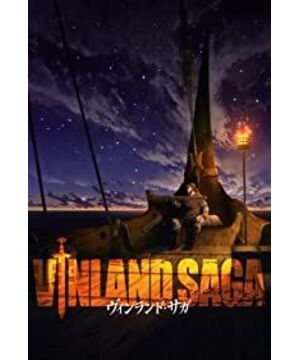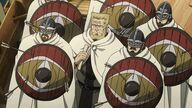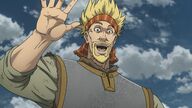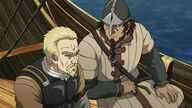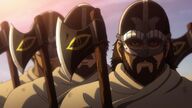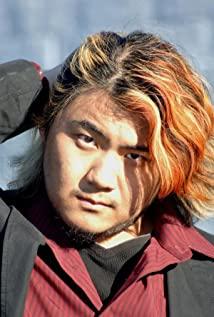1. Five categories of people who can be clearly divided
a. Vikings without self-awareness enslaved by the times (most of them, early Torfen)
b. People who have a sense of insight into the times, but have no ability to resist (some ordinary people who have questions because of being robbed and killed)
c. People who have a sense of insight into the times, have the ability to resist, but give up resistance or even sink and enjoy because of personal circumstances, will to power, etc. (Asherat, King Swain)
d. People who have a sense of insight into the times and have the ability to resist, but are worried about making compromises and only carry out personal resistance (Toltz)
e. Those who have a sense of insight into the times, have the ability to resist, and devote all their lives to the cause of resistance (Knuth the Great - believes that human beings will never be able to obtain equal love, do not believe but pursue Christian fraternity, agree to pursue the process Sacrifice a few people in the middle, target war to conquer everything, build civilization, discipline the people, spread ideas and build an ideal country; Torfin after the slave chapter - vowed never to use violence, devote his life to anything that can help around him, travel around and gather people to prepare Searching for Vinland in the New World without arms, determined to build an ideal country for the few who are not accepted by the so-called sacrificial era)
2. The perspective of the main line advancement - when the trial is in progress, not the heroic history of Asherath
a. The signs of a change in the consensus of the times: the story of Leif the Red Bearded in Vinland, the germ of resistance of Thors (the strongest warrior of the Vikings fled to Iceland to become a farmer, which made many Vikings puzzled; left unspeakable expressions ——"Real warriors don't need swords", which made the capable Viking warriors such as Torukor and Torfin very curious and painful to not understand the original meaning; the fate of the rebels who were too out of date was too obvious, and Thorz died. In the hands of Asherath, his actions before his death made a swinger like Asherath very depressed and contradictory; Torfin was given the opportunity to grow, and joined the Asherat Pirates to seek revenge.)
b. A corner of the times: the Asherath pirate group did evil (kill the village, eat and wait to die; the main event happened, King Swain attacked England, and the Asherath pirate group took advantage of the chaos to burn, kill and loot for profit)
c. The evil Asherat pirates were tried one by one:
1. Trial of Viking pirates: Asherat kidnapped Prince Knut and was chased by one of the strongest Viking legions, the Torukor Legion, Viking standard drama, slaughtered weak pirates and killed by stronger pirates, Part of the death; the Asherat pirate group fought and killed each other under high pressure. Except for Torfin's broken hand, Asherat's leg injury, the fatal stab of the watch wheel, and the two brothers alive, all members died, and the trial was over. . One of the two brothers went crazy, and the other returned to his hometown and still suffered from the torture of survival. After earning fast money from robbers, he could not live an honest life. Later, he was caught as a thief.
2. Judgment of the Viking small boss: It is impossible to die under the complete advantage of the poisonous mushroom, but due to Knut's intervention, he was stabbed to the point, resulting in death. The former suffers from being unable to determine whether Asherat is being regarded as a friend.
3. The protagonist of the trial, Asherath: kidnapped Knut and was hunted down by Torukor, but found that Knut was a prince abandoned by King Swain. Xuelu slaughtered the village, but accidentally missed the little girl who was absent because she confessed to the gods for stealing. Therefore, the traces were leaked and the subordinates fought each other under high pressure. Torukel came to the end, and finally almost all the subordinates who had accumulated for many years died; Awakened by a series of sights and experiences, Asherath was excited that he finally had a chance to leave the Viking environment and planned to devote all his energy, but King Swain offered a choice, killing Knut or destroying Wales, both. The result of both is one meaning: to destroy the lifelong dream that has kept Asherat alive, and to tell him that he will always be an ugly Viking.
4. The protagonist of the trial Torfin: Asherath died, the pain of losing the purpose of life; the pain of becoming a slave; the pain of being tortured by his own crimes for life. The core of the Slave chapter is Torfin's trial and self-redemption.
d. "Hero Possessed" Asherath Trial Vikings and Self Trial:
Asherat is a complex character, half of his mother's King Arthur blood, half of his father's Viking blood, born of his father's rape of his mother, and extremely disgusted with Vikings. After a few years, he successfully killed his father, but he also became a complete burning, killing and looting. of Vikings. His mother madly recites the legend of King Arthur all day long, which makes him yearn for the legend of King Arthur and Roman civilization, and is determined to protect the sanctuary Wales in his heart, but he has always lived as a Viking pirate that he hates, and has a high military force inherited from the Vikings , ruthless determination and insight that makes him very proud, can see through the essence of the times and people, but it is also painful to be able to see through his own situation, but he can't get rid of the original Viking-style desire - hope there is Wine and meat are good, but they refuse to work on their own. Asherat is very proud and enjoys the direct desire stimulation and superior status brought by pirates and high power, but he is very painful to his inner contradiction (he also feels like hell, waiting for some judgment to come), and he is everywhere. Slaughter the village, rob and eat and wait to die, while using the blood of King Arthur and the Viking environment who can understand but are trapped in the laws of history and cannot act on their own to distinguish themselves from the Vikings they hate (the ugly cloth was torn off by Thors and King Swain in person). ), Wales is the only sanctuary that keeps him alive, representing the reason, order, heroic fantasies that he has little but must preserve, and without Knut, Asherath has planned his own form of death: like him Just like killing his own father, let Tolfen kill himself, just like the fall of ancient Rome, the new overcomes the old (really very proud people, only willing to obey the laws of life), the stronger warrior kills the old warrior.
King Swain's choice is fate's final judgment on him, which is a hundred times more painful than the direct death judgment he himself expected, requiring him to kill Emperor Canute, who symbolizes the new order, or destroy the sanctuary he has always been. Wales, especially when he almost didn't want to die and wanted to help Knut change the world. Here, Makoto Yukimura really came up with a beautiful climax: the proud Asherat accepted the death sentence, but refused the way fate judged him, so he chose the murderer he was most familiar with but hated the most. Identity to play the "hero", shouting "King Arthur is coming", madly beheading the Vikings at the royal banquet (the trial of the Vikings and the Viking leader King Swain), and then, at the end of the curtain, waiting for the real hero protagonist Emperor Canute came on stage to judge himself, the biggest and ugliest of the mad Vikings.
3. Explanation
There's really no need to break down a work this way, because it's really risky (very likely inaccurate and arrogant and comical), so I don't want to or can't explain it too much. But the handling of wit makes me doubt their reading ability and planning ideas. Except for many unrestrained places, many image expressions (such as Asherath's attitude towards Wales) have been concretized, and the expression space is much smaller, resulting in It can be called an inaccurate author's expression (Makoto Yukimura's writing purpose in the slave chapter is too obvious). I just went through the comment area and barrage of station B in my spare time today. As far as my personal experience statistics are concerned, I don’t need serious statistics. More than 20% of the misreads can’t run away, and they are all shouting how handsome Asherat is. , Understand the difficulty of pirates.
That's why I wrote this, and I'm not phrasing it anymore. My original intention was to hope that vinland saga would not be misinterpreted as rationalizing fighting and relativism. The pirate chapter is written from the perspective of Asherath. Viking pirates Evil and crime trials are by no means a heroic history. The source of Asherat's charm is not only his decisiveness and purpose of carrying out his image as a hero, but also that he took the initiative to play a "villain supporting role" in the last scene of the "Heroes Arrival" drama designed by himself, and sentenced him to a sentence. The death penalty itself (it's a very beautiful design, no wonder some screenwriters say that they are writing other plots for a climax). You can't speculate on whether people like Asherat have a clear sense of confession, but he has completed his own trial in form, and he himself has admitted that he is a Viking before the trial of the Vikings. Of course, the slave arc is the more important proof of Yukimura Makoto's pirate arc's intentions. The slave chapter is a natural perspective of slave Finn, and the three-way dialogue between the god, Knut and the priest in the pirate chapter has the same meaning as the description of the farmer in the slave chapter and the face-to-face confrontation between the two of Tok, especially the author. He is still a preacher, and in interviews, he has always said that he first determines the author's intention, and then finds the background and story to express his intention. So I don't even know what wit thinks. It won't make a big difference to what kind of business results it is changed to. Either the two seasons are obtained, or the tone of the first season should be set accurately, otherwise it is really unclear and the benefits are very small.
The change of the farmer Ketil, the core character of the slave chapter, is the explanation of the three-way dialogue between Knut, the priest and the god that "human beings do not have fraternity, but non-human beings have it". The man who sheds tears of the orphan who stole his property, step by step unbalanced under high pressure:
4. Follow-up of vinland saga
Vinland saga has a total of three perspective characters. In the early days, it was the perspective of Viking pirates from Asherat, which talked about the evil and destruction of Viking pirates. After Asherat's death, the point of view naturally shifts to Torfin's view of slaves on Ketil's farm, and Knut's view of the power group as the orthodox line. It is worth mentioning that, in the original saga or in history, both of them have achieved phased results in the follow-up. The new continent of Vinland was discovered and the peaceful colonization of Tolphin succeeded in a short period of time. Knut unified the North Sea and eliminated war with war. Canute the Great promoted the spread of Christianity.
However, this does not mean that they successfully led the birth of a new era, and neither of them was absolutely successful in the end. Like Thors who was too out of date at first, Torfin failed and returned to Iceland. After Knut's death, the Viking Empire collapsed and the two people who tried to resist died in history. The laws of history are determined by the consensus of the group. The wheels of history roll over the individuals who act as chariots. The birth and transfer of consensuses constantly nurture new human beings. But unfortunately, one thing has remained the same. Humans always do not accept consensus. any life or anything other than that.
In vinland saga, Makoto Yukimura has always wanted to discuss more about "Christ's fraternity" and "loveless eternity" that fraternity can never reach, using a lot of plots to describe the disciplinary consensus, morality, rule awareness and love of human beings How to be smashed easily, the most classic is the farmer who shed tears for the orphan who stole his farm in the slave chapter. Under the high pressure of Knut, the whole situation became unbalanced, and he finally killed Arnez who wanted to escape. What is more interesting is that after throwing the question, Makoto Yukimura did not dare to comment rashly when faced with a big topic, but gave two answers very boldly and quickly, Tolfen and Knut, and then Have been trying to rationalize these two answers, almost writing to the clearance game haha. Of course, what is more interesting is the ending of the original story saga of vinland saga: Torfin returned to Iceland to farm after his failure, and died soon after. Grid chose to convert to Christianity, pulled his son with peace of mind to get married, and then was pilgrimage to the Vatican by the Pope. The interview, where, in front of countless believers, Grid told everyone all the news and history of Vinland. A standard historical loop is completed, experiencing, recording, disseminating, witnessing and being finalized by the group. It's a very eye-catching treatment, and I'm very curious about how Yukimura Makoto will change it.
View more about Vinland Saga reviews


